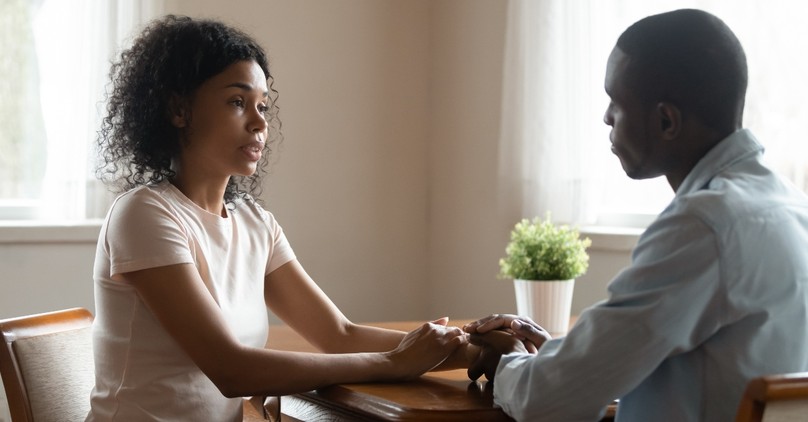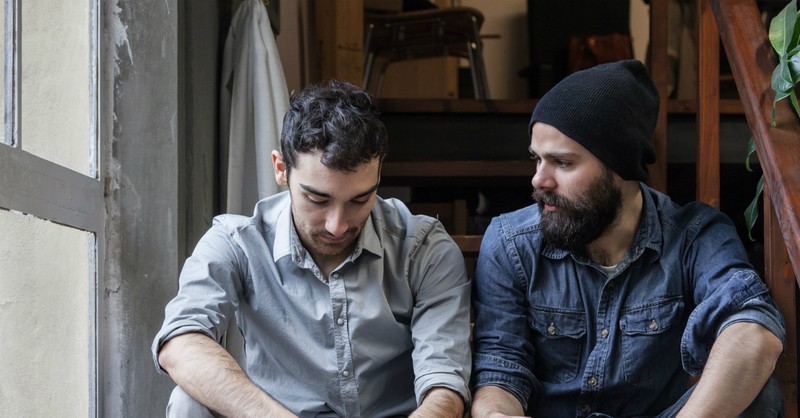
Sometimes today’s world can be a really scary place. People can be mean, and there are days it feels like I need to put on emotional, spiritual, and even physical armor just to go outside my door.
Over the years, I developed a notion that I needed an ironclad façade or I others would walk all over me like a dirty doormat. I convinced myself I needed to project the lie that I had my life together. Heaven forbid I show vulnerability or weakness lest I expose myself to attack.
Can you relate?
The trouble was that my ironclad façade started getting in the way of God’s intentions for me. For it was in moments of weakness that I began to feel God work in ways I’d never experienced, and the more I fought to maintain my emotional barricade, the slower the transformation.
It took time, but I slowly began to understand the spiritual value of being vulnerable — not only with the Lord but with other people.
Here, then, are five lessons I have learned about how being vulnerable can help our spiritual lives, deepening our relationship with the Lord and leading to powerful personal transformation.
Photo credit: ©Getty Images/fizkes

1. Being Vulnerable Helps Me Open Myself to Friendship
When we are vulnerable with other people, we can start to build trust. When we let someone else know our worries or our weaknesses, we become more relatable and, often, likable. It breaks down walls and opens doors.
There was a period in my life when I trusted very few people, and not coincidentally, I didn’t have a lot of authentic friends at that time, either. But one day I decided to take a chance and confide in a neighbor I barely knew about something going on in my personal life. It was a difficult season for me, and I decided to talk to her about it.
It was a risky decision. She could have been a gossip and decided to share my troubles with others, potentially hurting me. But thankfully, she didn’t. She listened, and she was there for me. I did the same for her. We grew closer and discovered we could be real and truthful with each other. It deepened our bond and helped us evolve from superficial friends to sisters in Christ. We’re still friends today, and our friendship blesses each of us. We help each other stay accountable. We help each other stay on God’s path.
I’ve taken risks over the years where the opposite happened, and that’s OK, too. My world didn’t end, nor was my reputation destroyed because someone betrayed my trust.
The benefits far outweigh any potential negatives.
As Proverbs 27:17 says, “As iron sharpens iron, so one person sharpens another,” and in Proverbs 17:17, “A friend loves at all times, and a brother is born for a time of adversity.”
Photo credit: ©Getty Images/Lorenzo Antonucc

2. Being Vulnerable Helps My Work-Life Balance
Several years ago, my daughter began experiencing wild mood swings. She was still very young at the time, not yet a teenager, and her problems spiraled quickly. Soon she was diagnosed with generalized anxiety disorder and severe depression. It only got worse as her teenage years approached.
At first I kept this very close to my heart. Only our family knew what was going on. But the pressures were starting to build, and I needed more flexibility in my working schedule. I feared sharing our family difficulties might make me appear irresponsible or unprofessional somehow — how could I be trusted to lead well in the workplace if I wasn’t able to lead so well in my home?
But I swallowed my fears and began to reveal my burden. It turned out this did not create the career crisis I’d feared. Instead, it was a huge weight off my shoulders not to have to carry that burden alone. Now I had a whole new set of people – people who genuinely cared about me – praying for what my family was experiencing.
Yes it was a risk, but it was incredibly worth it, and it increased communication professionally as well. It helped me streamline goals and begin to think more intentionally about my work-life balance and ways to accomplish tasks efficiently and effectively.
As Ephesians 4:25 says, “Therefore each of you must put off falsehood and speak truthfully to your neighbor, for we are all members of one body.” And as Proverbs 16:3 reminds us, “Commit to the Lord whatever you do, and he will establish your plans.”
Photo credit: ©Getty Images/Delmaine Donson

3. Being Vulnerable Helped Me as a Writer
I’ve been a writer since I was a child and a journalist since my twenties. I majored in journalism, I have a master’s in English, and I also write fiction. It’s difficult to be a writer and not have some level of vulnerability.
Yet I noticed when I started becoming vulnerable in my personal and professional life, my writing life began to transform in ways I couldn’t possibly have imagined. My writing deepened and strengthened as I became more comfortable sharing in “real life” about some of the hardships I experienced. I also began connecting more authentically with my readers, often receiving feedback about how a particular blog post or story encouraged or resonated with them.
I came to realize there had been a wall — self-imposed — that I’d erected between me and the world, and tearing that wall down was sweet liberation. Where before I’d hesitated to divulge heartache or struggle, now I experienced indescribable relief and, eventually, joy as long-concealed pain came to light. God began using that darkness for good.
As Ephesians 5:11 and 13 urges, “Have nothing to do with the fruitless deeds of darkness, but rather expose them. … Everything exposed by the light becomes visible — and everything that is illuminated becomes a light.”
Photo credit: ©Getty Images/BrianAJackson

4. Being Vulnerable Helped Me Focus on the Big Picture
The more vulnerable I became, the more I realized an important truth: I’d wasted far too many years hiding my true self from the world. I had walled myself off from other people, thinking I was “surviving,” ultimately protecting myself from harm. In reality I was isolating myself.
I began to analyze why I hesitated to reveal my struggles and pain in the past and soon understood my priorities were skewed. That whole time, I had been worried about pleasing other people or appearing perfect in the eyes of the world. Instead, I should have been focused on pleasing God. I should have been trusting that he would take care of me instead of cultivating a false identity as a woman who had her life “together.”
Being vulnerable made me realize that it’s absolutely OK to acknowledge when we experience difficulty. Other people are not my judge or jury. At the end of this life, it makes no difference at all what other people think of me. What really matters is God — has my focus been on the Lord? Have I been doing his work? Am I using my gifts in a way that furthers his kingdom? Am I drawing others into his church so they, too, can be followers of Jesus?
I spent way too many years worrying about my concerns and image when I should have been thinking about far more important things. Being vulnerable made me see this.
As Colossians 3:2 reminds us, “Set your minds on things above, not on earthly things.” And as 1 John 2:15 says, “Do not love the world or anything in the world. If anyone loves the world, love for the Father is not in them.”
Photo credit: ©Getty Images/fizkes

5. Being Vulnerable Increased My Dependence on the Lord
When I was young, it seemed so important for me to be independent, to stand on my own two feet in the world and learn to “handle” life. But as I grew in my faith, I began to realize that independence is the exact opposite of where we should be in our relationship with God. God designed human beings to be in perfect relationship with him. We’re not supposed to stand on our own. He is always walking with us. Sometimes God does not answer our prayers the way we want him to, but that is because his plan is better than our plan and our desires.
Learning to be vulnerable with other people made me realize I was being too independent, and not only when it came to other people. I was actually making myself into an idol. Vulnerability opened my heart and made me understand I’m supposed to be going to the Lord with my problems. It helped me understand that Jesus is walking with me — and sometimes he’s carrying me, too. I’m not meant to do this alone.
Jesus said in John 15:5-7, “I am the vine; you are the branches. If you remain in me and I in you, you will bear much fruit; apart from me you can do nothing. If you do not remain in me, you are like a branch that is thrown away and withers; such branches are picked up, thrown into the fire and burned. If you remain in me and my words remain in you, ask whatever you wish, and it will be done for you.”
Proverbs 3:5-6 says this another way: “Trust in the Lord with all your heart and lean not on your own understanding; in all your ways submit to him, and he will make your paths straight.”
Vulnerability can be scary, and the world can be a dangerous place for us all. But we are safe in Christ, and when we learn to be more vulnerable, the benefits can lead to deeper spiritual maturity and positive life changes.
As Scripture tells us in Matthew 10:28, “Do not be afraid of those who kill the body but cannot kill the soul. Rather, be afraid of the One who can destroy both soul and body in hell.”
Amen. Thanks be to God!
Photo credit: ©Getty Images/GordonImages
Originally published Monday, 12 February 2024.





